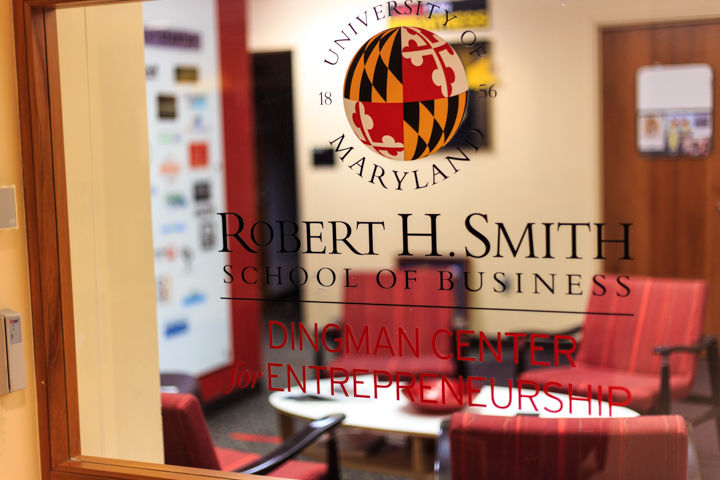
The Dingman Center for Entrepreneurship in Van Munching Hall.
A University Senate committee is working to turn a 39-page policy into something University of Maryland faculty will not only understand, but also agree with.
Members of the senate proposed changes to the university’s intellectual property policy, which deals with how much ownership faculty have over inventions, publications and other works they create while employed by the university, but the body voted last week to recommit a proposed rewrite to the Intellectual Property Committee to assess the problems faculty members had with it.
READ MORE: University Senate votes to delay intellectual property vote
While the purpose of the update was to simplify what psychology professor and committee chairman Robert Dooling called a “murky” and “awesome” document from 39 pages down to nine, some faculty members said the changes went too far, oversimplifying topics such as revenue distribution and software.
The current policy contains many exceptions, but in general, it usually gives the university ownership of intellectual property if an inventor or creator receives outside funding for his or her project, such as a grant. However, the university often will assist inventors in patenting or licensing their inventions.
Animal and avian sciences professor Richard Kohn said professors do not have enough control under the current policy. Kohn, who has three patents, said that if professors worked to create something, it did not make sense for them to lose control over it.
The proposed version would give administration more control over the policy itself, which Kohn said could allow them to “override the policy whenever they want.”
“The changes to the proposal don’t guarantee anything to faculty, staff or students, and at the same time it says we agree to waive the rights to own our work,” he said.
Software is also dealt with differently in the proposed version.
Under the active policy, software ownership is explained in what Dooling called a hard-to-read, seven-page section the committee removed to simplify the document, Dooling said. The revision made software legally similar to other inventions under patent law.
READ MORE: Faculty could have more rights to their inventions with Senate update
This method could make it much harder for professors and graduate students to share essential software with peers or make open-source software, said Benjamin Bengfort, senate representative for the computer, mathematical and natural sciences college.
For example, Bengfort is currently working on a 1,000-line code that, while small, could be used by biology, astronomy or other students in the college. The proposed policy would make it much harder and more time-consuming to share his work, he said.
“To them, their software does feel like it is part of their tangible research and therefore should be protected under intellectual property, similar to patent law,” said Bengfort, a computer science doctoral student. “That is our material. It is not just bundled up with some deeper form of research.”
Bengfort said he wanted software ownership to function more like copyright law, in which rights turn over to creators, an outcome that would be friendlier for providing open-source software.
The policy also contradicts itself when applied to graduate students, he said. While the proposed policy would give complete control to materials students make in class, almost all graduate students are employed by the university, Dooling said. This creates confusion as to whether they have full control like students or if the university owns the intellectual property, as it does for employees.
The proposed law also would change the way revenue is distributed. In the current policy, revenue is poorly explained, Dooling said.
The proposed version breaks the process down into a four-part process and gives about 10 percent less to faculty but will provide the department with more funding. This incentivizes and supports programs to continue with research and entrepreneurial efforts, he said.
Teaching and learning, policy and leadership professor Patricia Campbell said she wanted the committee to explain exactly how the update would modify revenue distribution from the active policy and how a change would impact the net revenue for creators.
The committee will spend the next month collecting and reviewing feedback and requests from university departments to reach an acceptable version of the policy, Dooling said.
As the committee addresses these issues, Dooling said, it is important to remember the vice president of research can provide waivers to help faculty keep ownership in certain situations, despite the complexities with the policy.
“The idea is to be ultimately flexible and to always provide faculty [a variety of options] for an appeal,” he said.



